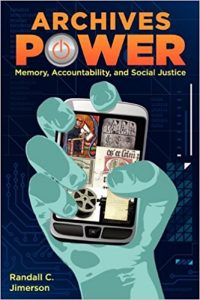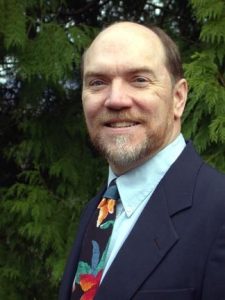

By Hannah Yetwin
Randall Jimerson is the director of the graduate program in Archives & Records Management and professor of history and at Western Washington University in Bellingham, Washington. He is a past president of the Society of American Archivists (SAA), as well as New England Archivists (NEA). He’s had an illustrious career in the archives and in education, and has been a part of many impactful programs, projects, and organizations. I spoke to him for about an hour about all things archives, particularly about his perspective and role played in outreach and advocacy.
Professor Jimerson was interested in history from a young age. As a child, he moved from Massachusetts to Virginia and was called a “Yankee” upon entering school. He was curious about the origin of that word, and that sparked his interest in historical research. Later, he earned a PhD in American History at the University of Michigan and began his archival career at the Bentley Historical Library. He continued to a full-time position there and was officially hooked on archives. Currently, his time involves teaching graduate and undergraduate courses, coordinating internships for graduate students, and research and writing of his own. He is presently writing an article about a fellow archivist for a dictionary of archivists.
For the first half of his career, Jimerson was an archivist at the University of Michigan, then Yale, and finally the University of Connecticut. He was the only archivist at UConn for an extended period in the 1980s, and outreach & advocacy were things he did in the rare instance of having free time. However, he found outreach to be essential: “If we’re not doing outreach, what’s the point of acquisition and trying to do reference service?” he asked. While he was at UConn, Jimerson completed 4 grant projects, one of which was a grant proposal for developing a records management program in the archives. He worked across departments surveying records and began a process of creating retention schedules, promoting the service of archives, and helping offices to access and file their own records easily. He created a 60-page pamphlet for assistance and advice for department heads to do their own recordkeeping.
When asked about what makes a good outreach/advocacy project, Jimerson pointed to the key elements, starting with defining an audience. He narrows it down to the following things: targeting specific audiences, clearly defining the statement you want to convey, and considering outreach to be a fundamental part of an archives program all the time, not occasionally. Jimerson has seen industry-wide improvement since the 1980’s, and although there is a lot of emphasis and concern on archival encoding over outreach and advocacy, he thinks there is a growing awareness and understanding of archives. In the 1980s, he was involved in the planning and development of a project providing basic archival education to people around New England with the NEA. This program was designed for librarians, town clerks, historical society professionals, and people that worked with archival materials but had no formal archives experience or training. The function of the program was to teach professionals what to do with archival materials to put into effect good management of archives for preservation and access purposes. This occurred in the form of day-long workshops, covering archival theory and concepts. These workshops happened in a dozen locations in every New England state. 6 weeks after each workshop, there was a follow-up that was essentially a survey of what those professionals had implemented in the time since the workshop and covering follow-up questions. Just being involved was a very rewarding project for him and seemed to have met some of the outreach and advocacy needs he thought the profession needed, and defended the needs of non-archivists who have responsibility for archival materials.
With regards to challenges in outreach and advocacy, Jimerson responded that getting recognition and understanding for archives from resource allocators is the most challenging; that people who control budgets often don’t think that archives need a lot of support. When dealing with stakeholders, defining who the audience is, making the importance of the records very clear, making clear decisions about which audiences are served, and then how to go about developing a centralized mission are crucial. Stakeholders look for a mission statement or a strategic planning process in mind. If an archivist doesn’t have a clear sense of what services one can provide, it’s going to be difficult to convince anyone that you’re doing anything important.
As for his current role in outreach & advocacy, Jimerson explained that he considers everything he does to be public programming and outreach. As the director of an archives and records management graduate program, he works for archival awareness from many different angles. He considers teaching to be outreach; by facilitating this kind of professional development in others, he is doing outreach on behalf of the general concept of archives. When it comes to the future of outreach & advocacy, Jimerson says it’s important for anyone working in an archive to have some engagement: talk about their work, post blogs, tweet, etc. Institutional cultures should be adjusted to allow people in all positions to participate in outreach to promote archival repositories. Jimerson’s current work focuses on the role of archives and archivists in society, including concepts of memory, accountability, social justice, and professional ethics; all themes which are supported by proper outreach and advocacy programs within archives.
To find out more, check out his book, Archives Power: Memory, Accountability, and Social Justice
